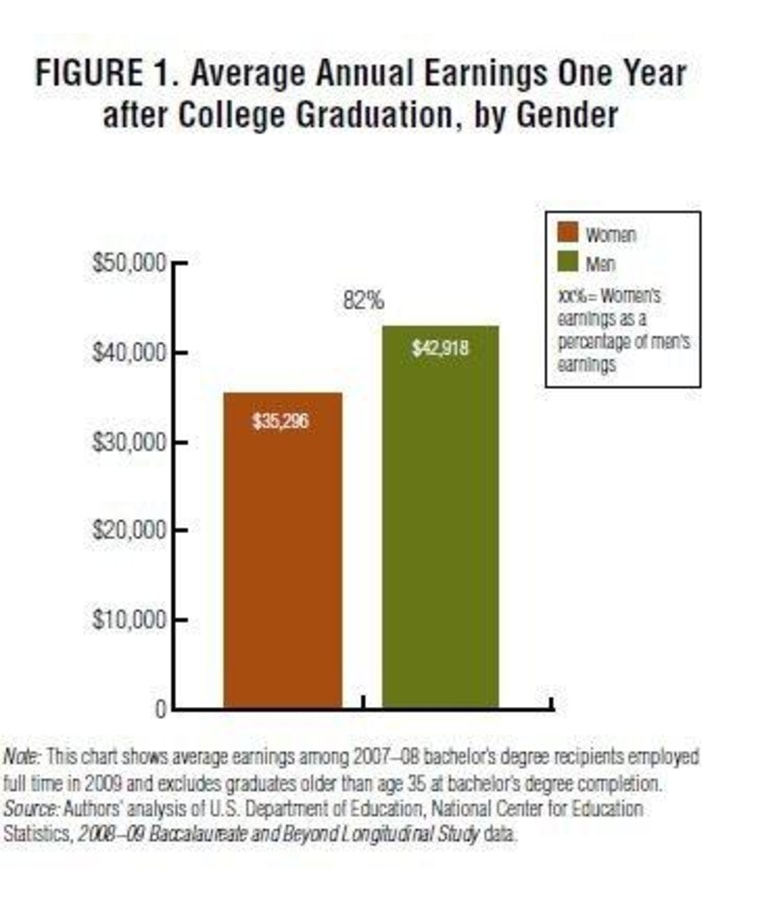The gap between what female and male college graduates earn may start as soon as new grads collect their first paycheck.
A new analysis of government data finds that, on average, male college graduates were earning more than their female classmates just one year after graduation. The gap was persistent, although smaller, after controlling for factors such as choice of major and job.
“Women are making progress, for sure, in education and in the workplace,” said Christianne Corbett, a senior researcher with the American Association of University Women and an author of the report. “But the pay gap is real. It’s still there. That’s what’s so confounding about it.”
The AAUW took a look at what 2008 college graduates were earning one year later, in 2009. They found that on average, the female graduates who were working full time were earning 82 cents for every dollar their male peers were earning.
The average salary for women was $35,296, compared with $42,918 for men.
There are some factors that can at least partially explain that gap. Although more women are entering traditionally male-dominated fields, men are still more likely to pursue majors that can command higher paychecks, such as engineering and certain science fields, the researchers said.
Meanwhile, women remain more likely to gravitate to lower-paying fields like education and health care.
So the researchers controlled for factors such as what graduates majored in, where they went to college, what field they were working in, how many hours they worked and even their grade point averages.
They found that even after accounting for all those things, the female graduates were still earning about 7 percent less than their male peers.
“There’s good reason to believe that part of that unexplained gap is due to gender discrimination, and most of it is probably unconscious,” Corbett said.
Francine Blau, an economist at Cornell who has studied the wage gap extensively, said there are things that can be done to narrow the overall wage gap, such as getting more women to go into math and science fields that pay better.
Still, she said it’s also important to consider whether bias is to blame for the remaining 7 percent wage gap that can’t be explained by other factors. She noted that in the modern era, that doesn’t necessarily mean hiring managers are consciously deciding they should pay women less for the same work.
“Discrimination doesn’t have to conscious and overt. It can be subtle and even unconscious,” Blau said. “As we’re seeking to reduce that, we should bear that in mind.”
Blau said the 7 percent gap is likely smaller than it has been in years past.
Still, she noted, there’s other evidence to suggest that the gender difference in pay will get bigger as these women get older. It’s not clear if that’s because women choose different career paths, slow their career for family and child care responsibilities or face bias.
“I’m guessing that if we could follow these women over the years, there’s a fair probability that the gap will widen,” Blau said. “But I think they’ll still be doing better than their predecessors.”
The research comes as more women than men are going to college, and it’s becoming increasingly common for women to pursue traditionally male-dominated fields. But even when women choose the same major as men, they still may not be getting as fat of a paycheck in return, the new data suggest.
Female business majors who graduated in 2008 were making an average $38,034 one year after graduating, compared with $45,143 male business majors.
Similarly, female engineers were making an average $48,493 a year after graduation, compared with $55,142 for men.
Wages were more likely to be equal for men and women who had majored in health care, education and the humanities.
Corbett said one explanation for this difference is that women are less likely to be using the degree they earned. She said research has found that men who get an engineering degree are more likely than women to get a job that requires that degree.
Other research has shown that women with science degrees are more likely than men to then take clerical or other administrative jobs.
The researchers also found that the wage gap was much wider for men and women who attended private, nonprofit universities than for those who attended public universities.
In general, women who work full-time, year-round earned 77 cents for every dollar a man earned in 2011, according to the latest Census data released last month. That gap has been relatively stable for years.
Other government data also has shown that women tend take home less money each week even when they are doing the same job as a man. For example, the median weekly earnings of a female medical scientist was 77.6 percent of the median weekly earnings for a man in the same field, according to Bureau of Labor Statistics data from 2011.
Related:
Women face stubborn wage gap as wages fall for everyone
Amid recession, an uptick in wives ourearning their husbands
